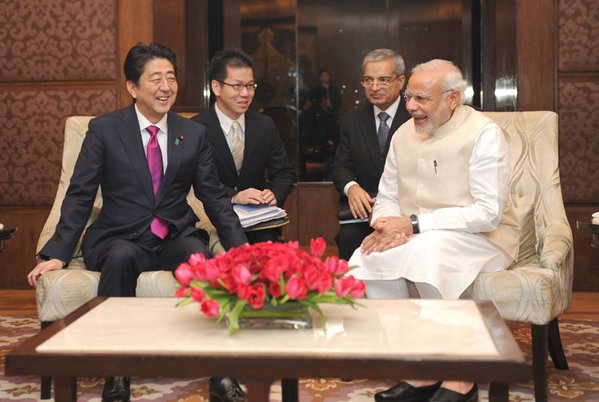Indo-Japan Meet: Pacts on Bullet Train, Defence, Nuke Energy
After Modi-Abe talks, the two countries signed a broadbased MoU for cooperation in civil nuclear energy with the final pact to be signed after certain technical and legal issues are thrashed out.
Modi and Abe, both right-wing nationalists, have forged an unusually close relationship since the Indian leader came to power previous year, in part to counter China’s growing influence. In the meeting it was decided that Japan would help to build India’s first bullet train network between Mumbai- Ahmedabad costing of around Rs. 98000 crores.
The most eye-catching deal was the new bullet train which will slash journey times between the Indian cities of Mumbai and Ahmedabad, reportedly from eight hours to about two hours. “It will become an engine of economic transformation in India”, Modi said in a speech, according to Reuters. “The partnership between India and Japan has infinite potential”.
Abe, who is on a three-day visit to India, described the agreements as heralding a new era of cooperation between the two countries.
“The significance of today’s agreement is that the two countries have reached an agreement that will provide the basis for a cooperation in nuclear technology for peaceful goal”, he said adding both the sides have “in principle” agreed to cooperate on nuclear technology.
“We also appreciate the sharp increase in Japanese bilateral assistance and the strength of public and private Japanese commitment for the Make in India mission”, he said. Apparently, the Indian side gave assurances to Japan’s strong non-proliferation lobby to expedite the deal, but the Japanese preferred to play safe and sought time necessary for Prime Minister Abe to convince the Japanese parliament on the assurances given by India.
Modi’s government has set up an office to promote inward investment from Japan and the two leaders last year vowed to double direct investment within five years.
Japan once shunned nuclear cooperation with India, which has not ratified the global nuclear Non-Proliferation Treaty, but analysts say Tokyo has since softened its stance.
It said that the agreement would be signed after the technical details, including those related to the internal procedures, were finalised.
“India and Japan will work to strengthen regional economic and security forums and coordinate their actions to tackle global challenges including the reform of the United Nations, climate change as well as terrorism”, it said.
There was political resistance in Japan to go ahead with a nuclear pact with India, particularly after the disaster at the Fukushima Nuclear Power Plant in 2011.
The ancient temple town, situated less than 15 kms from Sarnath where Buddha delivered his first sermon upon attaining enlightenment, boasts of a special place in the religious and cultural consciousness of Japan as well as most of the South East Asian countries with sizeable Buddhist populations.
Today there is a Make in India movement in Japan with a $12 billion fund, said PM Modi. Now we will have nuclear trade with them.
It said in this context, Abe stressed the importance of early entry into force of the Comprehensive Nuclear Test Ban Treaty (CTBT), which should lead to nuclear disarmament.








